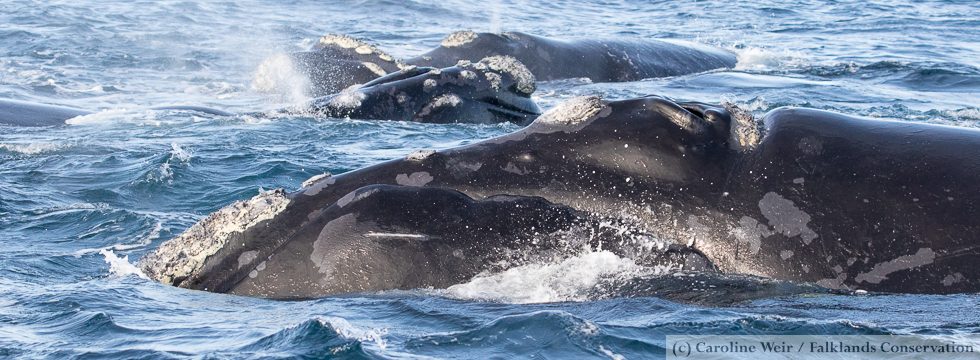Southern right whale research
The southern right whale (Eubalaena australis, SRW) is a large and charismatic species that inhabits subtropical to subpolar areas of the Southern Hemisphere. SRWs were heavily exploited over several centuries of whaling, due to their accessibility in nearshore habitat, large oil yield, approachability, and tendency to float once dead. However, in recent decades there has been evidence of increasing population size at many of the core winter breeding grounds in Argentina, Brazil, South Africa, Australia and New Zealand, and SRWs are currently listed as globally Least Concern by the International Union for Conservation of Nature. Nevertheless, regional fluctuations in recovery rates and high calf mortalities in some years mean that SRWs are still of conservation and management concern.
In the Falkland Islands (south-west Atlantic), data support a historical and ongoing use of pelagic areas during the austral summer and early autumn, presumably for both foraging and migration. However, in 2017, during Caroline’s work on sei whales in the Islands for Falklands Conservation, a contemporary occurrence of SRWs was discovered using coastal waters during the austral winter (Weir and Stanworth, 2019). Subsequently, a targeted SRW research programme was established during the winter of 2019, which has run annually every winter since with funding from Darwin Plus (DPLUS082 and DPLUS126) and input from a range of experienced project partners. The work carried out to date has included:
- Visual surveys of spatio-temporal distribution using vessel and aerial platforms;
- An aerial abundance survey carried out in 2023/24;
- Photo-identification work to identify individual whales from the callosity pattern on their heads and to investigate their movements, population size, and scarring;
- Satellite tracking to collect data on movements, habitat use, and dive behaviour;
- Biopsy sampling to collect small tissue samples to carry out genetic, stable isotope and hormone analysis;
- Acoustic monitoring to characterise the vocal repertoire and assess temporal occurrence;
- Unmanned aerial vehicle (or ‘drone’) work to assess age composition, body condition and health.
The work has revealed that SRWs aggregate annually in the coastal waters of the north-east Falklands during winter (May to September), with groups exhibiting both breeding (mating) and socializing behaviour. The presence of numerous ‘gunshot songs’ in the winter acoustic recordings further confirms mating behaviour, since the songs are considered to be reproductive display by adult males. Satellite-tracking has linked the whales in the Falkland Islands to those using the major winter calving ground at the Valdes Peninsula in Argentina, but we have also recently encountered an adult female right whale that had been tagged on the South African calving ground (Vermeulen et al., 20243), indicating that the Islands may be used by more than one SRW population. The work has already led to the nearshore waters in the north-east Falklands being internationally-recognised as an Important Marine Mammal Area (IMMA) for SRWs. In January 2025, the SRW was also accepted by the IUCN as a qualifying species in the Falkland Islands Inshore Key Biodiversity Area. Outputs from the ongoing work, including scientific papers, will be listed below as they become available.
We are proud to be part of the Southern Right Whale Consortium, an international collaboration with the ultimate goal of improving understanding and conservation management of the southern right whale across the globe.
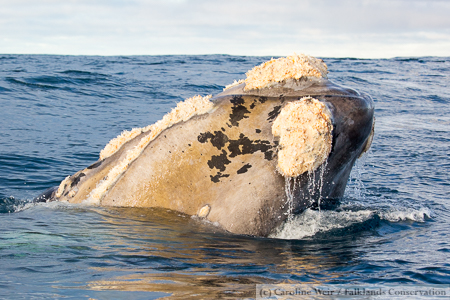
Grey morph right whale, Falkland Islands.
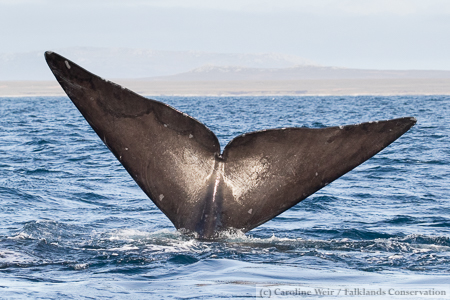
Southern right whale tail.
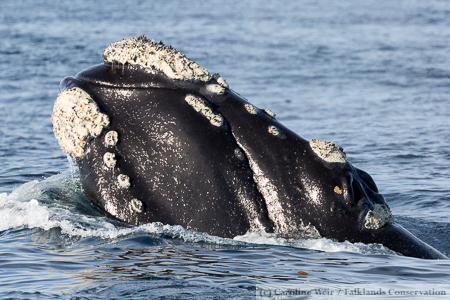
Socialising southern right whale.
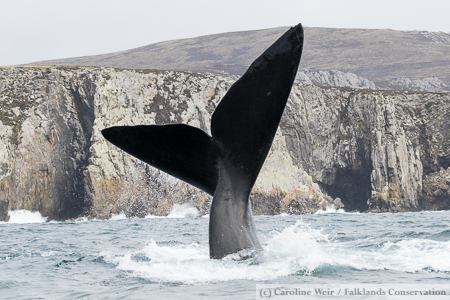
Right whale in the Falkland Islands.
Publications and downloads
- Weir, C.R. (ed.) (2025). Distribution, abundance and movements of sei whales and southern right whales in the Falkland Islands. Technical Report for DPLUS126. Falklands Conservation, Stanley, Falkland Islands. Version 2, 31 January 2025. 236 pp.
- Weir, C.R. (2024). Supporting evidence for the addition of the southern right whale (Eubalaena australis) to the Falkland Islands Inshore Key Biodiversity Area. Falklands Conservation, Stanley, Falkland Islands. 17pp.
- Weir, C.R., Fernandez, S., Jackson, J.A., Miller, A., Sucunza, F., Slesser, H.W. and Zerbini, A.N. (2024). Movements and behaviour of southern right whales satellite-tracked in and beyond a subantarctic archipelago wintering ground. Endangered Species Research, 55: 229-245. https://doi.org/10.3354/esr01371
- Weir, C.R., Jackson, J.A., Miller, A., Sucunza, F. and Zerbini, A.N. (2024). Movements and dive behaviour of southern right whales (Eubalaena australis) satellite tagged at a south-west Atlantic archipelago on the Patagonian Shelf during 2022. Paper SC/69B/CMP/01Rev1 submitted to the International Whaling Commission. https://archive.iwc.int/pages/view.php?ref=22044
- Vermeulen, E., Germishuizen, M., Kennedy, A., Wilkinson, C., Weir, C.R. and Zerbini, A. (2024). Swimming across the pond: First documented transatlantic crossing of a southern right whale. Marine Mammal Science, 40: 309–316. https://doi.org/10.1111/mms.13071
- Weir, C.R. (ed.) (2022). Conserving Falklands' whale populations: addressing data deficiencies for informed management. Technical Report for DPLUS082. Falklands Conservation, Stanley, Falkland Islands. Version 2, 30 Oct 2022. 231 pp.
- Hörbst, S., Charlton, C., Gregory, E., Christiansen, F., Dawson, S., Hamilton, P., Salgado Kent, C., Minton, G., Rowntree, V., Sironi, M., Uhart, M., Weir, C.R., Vermeulen, E. and Pettis, H. (2022). Developing a global, standardised qualitative visual health assessment protocol for southern right whales. 24th Biennial Conference on the biology of marine mammals. Palm Beach, Florida, 1-5 August 2022.
- Weir, C.R. (2021). Southern right whale (Eubalaena australis) surveys in the Falkland Islands (Malvinas) during winter 2019 and 2020: preliminary results. Paper SC/68C/CMP/09Rev1 presented to the International Whaling Commission, Cambridge, UK.
- Baines, M. and Weir, C.R. (2020). Predicting suitable coastal habitat for sei whales, southern right whales and dolphins around the Falkland Islands. PLOS ONE 15(12): e0244068. https://doi.org/10.1371/journal.pone.0244068
- Weir, C.R. and Stanworth, A. (2020). The Falkland Islands (Malvinas) as sub-Antarctic foraging, migratory and wintering habitat for southern right whales. Journal of the Marine Biological Association of the United Kingdom, 100: 153–163.
- Weir, C.R. (2017). Developing a site-based conservation approach for sei whales Balaenoptera borealis at Berkeley Sound, Falkland Islands. Falklands Conservation report. Version 1.0, September 2017. 115 pp.
All content and images are copyright Caroline R. Weir (2025)

